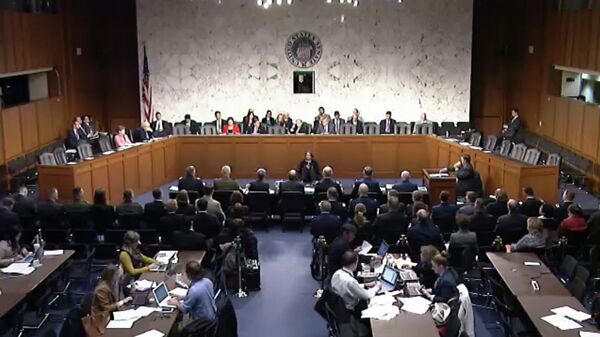On June 19, the US Senate passed its version of the 2019 Defense Authorization Act. Secreted in its depths was a small yet revolutionary amendment requiring Department of Defense Education Activity (DoDEA) officials to establish policies and procedures to protect students who fall victim to sexual harassment, by March 31 2019.
"The committee believes DoDEA policies and procedures for response to sexual harassment cases fail to respect the rights of victims and lead to inadequate and insufficient responses to complaints of sexual harassment in its schools," the proposal's accompanying explanation read.
Senators also included a provision in their version of the defense authorization bill that requires the DoD Inspector General to conduct a comprehensive assessment of DoD's and DoDEA's policies and procedures regarding misconduct, including sexual misconduct.

Roeder played a pivotal role in securing the obligation — speaking to Military Times, she said while her daughter had been out of the DoD school system for three years, shed' "invested too much to let it go," and would have continued her crusade "no matter how long it took."
No Playground
Roeder's campaign was kickstarted when her daughter Gretchen suffered sexual harassment at Vilseck High School, a little-known DoDEA educational facility in Germany. In 2013, one of Gretchen's classmates urinated into a bottle while seated near her during class — later, as they exited, he asked her, "did you see it that time?" — a reference to his penis.

Eighteen months later, Roeder discovered the school's principal had classified the incident as misconduct, not sexual harassment, which meant there was no record of it ever happening. As a result, the DoDEA's record would "stay clean" — and while the perpetrator was later returned to the US along with his family, there was no disciplinary hearing.
Subsequently, Roeder doggedly pursued the issue with DoDEA and DoD officials, demanding they establish clear policies regarding sexual harassment of students in DoDEA facilities the world over.
In particular, Roeder raised concerns about how sexual harassment complaints are investigated, how parents can appeal DoDEA decisions, and how victims are or aren't informed of punishments. She found there was no structure in place to help victims, or for rehabilitation of offenders to prevent them from persisting in such behavior.
Unspoken Scandal
Susan and Gretchen met Senate staffers in March 2018 to discuss their experiences, and the inadequacy of DoDEA sexual abuse provisions — attendees were evidently highly receptive, given the speed with which supportive amendments were weaved into pending legislation.
However, it may not be coincidental the visit came not long after Associated Press (AP) published a series of articles documenting the issue of child-on-child sexual assault in US military bases and schools, and the failure of authorities to appropriately deal with such cases.

Similarly, at a base elementary school in Naples, Italy, several families complained in 2009 and 2010 administrators responded too slowly to allegations classmates were sexually assaulting their daughters. One father accused Pentagon school officials of acting like wasn't "a big deal." The cases surfaced after a lawsuit was filed by a school counselor who was fired after he discussed the incidents with a military reporter. He told AP school officials didn't want to hear about the assaults — "there was silence…no action…they were scared to deal with it."
The next article revealed Army's Criminal Investigation Command had under-reported the number of investigations its agents had conducted, with bases in Hawaii, Louisiana, Missouri, Alabama, Alaska, Oklahoma, South Korea and Germany all claiming there were zero reported sexual assault incidents, while in reality all were home to ongoing investigations of that ilk.
In a 10-year period; at least 12 cases were reported at Schofield Barracks in Hawaii, with investigators concluding 11 were true; at least six were reported at Fort Leonard Wood, Missouri, with investigators concluding all were true; at least four at Fort Polk, Louisiana, with investigators finding three were true; at least six at Fort Sill, Oklahoma, with investigators finding five were true. In all, investigators concluded allegations were true in 83 percent of cases across all bases — although as of June 2018, the DoD is yet to disclose the number of pending sexual assault investigations it has on the books relating to children on base.



